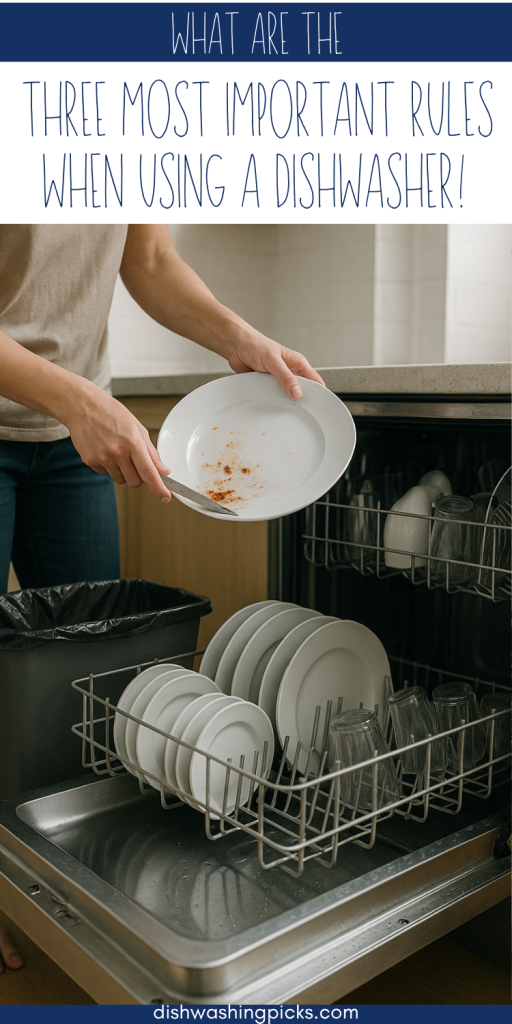
The Dishwasher 101 Nobody Told You
Alright, real talk—how often do you just toss your dishes in the dishwasher, hit “Start,” and walk away like a boss? (No judgment—we’ve all been there.) But using your dishwasher right isn’t just about pressing buttons and praying your wine glasses survive. There are a few key rules that can make the difference between sparkling dishes and a dishwasher disaster.
So, if you’ve ever pulled out a plate with yesterday’s spaghetti still clinging on or found yourself deep-cleaning your machine more than you’d like, it might be time to check your dishwasher etiquette.
Let’s dive into the top three rules every dishwasher user actually needs to know. Trust me, your dishes—and your machine—will thank you.
Rule #1: Scrape, Don’t Rinse—Yes, Really!
Here’s a weird truth: modern dishwashers actually clean better when your dishes are a little dirty. Sounds like a setup, right?
But here’s why: Dishwasher detergent is designed to latch onto food particles. So when you pre-rinse everything until it’s squeaky clean, your soap just… floats around like, “Uhh, what now?”
Try thinking of it this way: You wouldn’t shampoo perfectly clean hair, right? Same logic.
Now, that doesn’t mean you should toss in half a pizza. Just scrape off the big stuff—bones, sauces, the occasional science experiment from the back of the fridge—and you’re golden.
Rule #2: Load Like You Mean It (There’s a System)
Ah, the great dishwasher-loading debate. Forks up or down? Bowls angled left or right? Random chaos or carefully curated symmetry?
Let’s break it down:
- Top rack: Cups, glasses, small bowls—angled down so water can actually reach the insides.
- Bottom rack: Plates, pots, pans, and bigger bowls. Space them out so they don’t block each other (no stacking, please!).
- Utensil basket: Mix it up—some forks up, some down, especially knives (sharp side down, for obvious reasons). This avoids “nesting,” which is when utensils spoon each other (literally) and don’t get clean.
Imagine this: You’re giving each dish a front-row seat at the Clean Show. No backstage passes allowed.
Rule #3: Don’t Overcrowd—It’s Not a Tetris Game
We get it—you want to avoid doing another load. But if your dishwasher looks like a game of high-stakes Jenga, chances are those dishes won’t come out clean. Worse? You might block the sprayer arms entirely.
More dishes = more time = more water wasted if they’re still dirty.
Pro tip: If you can’t run your hand between items without bumping into something, you’ve probably overstuffed.
What Not to Put in the Dishwasher (Unless You Like Regret)
You’ve mastered the rules—but now it’s time for some tough love. Not everything that looks dishwasher-safe is dishwasher-safe. And trust me, learning this the hard way usually involves warped plastic, dull knives, or melted kitchen tools. Fun!
Here’s a short list of stuff you should definitely hand-wash instead:
- Wooden utensils or cutting boards – The dishwasher dries them out like a desert. Hello, splinter-ville.
- Cast iron pans – Just… don’t. Water + cast iron = rust and heartbreak.
- Insulated mugs or travel cups – That vacuum seal inside? The dishwasher breaks it down. Suddenly, your “hot” mug is lukewarm forever.
- Sharp knives – Dishwashers dull the blade and can damage the edges. Wash ‘em by hand and keep them sharp like your wit.
- Non-stick pans (depending on brand) – Some coatings can wear down over time with machine washing. Check the label first.
Quick challenge: Check your dishwasher right now. Is any of the above in there? Rescue it. Save its life.
Little Habits That Go a Long Way
Okay, you know the big rules. But let’s not forget the tiny habits that can make your dishwasher run smoother than a fresh jar of peanut butter.
Here are a few that are easy to remember—and super helpful:
- Run hot water in your sink first: Before starting your dishwasher, let the tap run hot. That way, the cycle starts with already-hot water.
- Clean the filter regularly: That gunky trap under the bottom rack? Yeah, clean that once a week. No one wants spaghetti bits fermenting in there.
- Use rinse aid: It helps dishes dry better and prevents water spots. It’s not just a sales gimmick—it actually works.
- Keep the door cracked open after a cycle: Helps moisture escape and keeps things from smelling… funky.
Try thinking of your dishwasher like a car. A little TLC = better performance and fewer expensive “oops” moments later.
Respect the Machine, Reap the Rewards
So, are dishwashers miracle machines? Well, kind of. When used right, they save time, water, and maybe even your sanity on a busy weeknight. But they’re not magic. Following the “three golden rules” (plus a few bonus habits) can seriously level up your dishwashing game.
And hey, if you treat your dishwasher well, it’ll treat your dishes even better.
Now go forth and dish-wash like a legend. Or better yet, send this to that one roommate or partner who really needs to hear it. You know the one.
